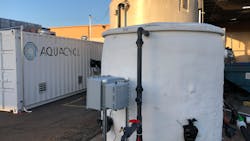How to reduce the risks associated with wastewater treatment
Dealing with process wastewater can be a major headache. Make a mistake and the penalties, both financially and in terms of reputation, can be significant. Below, we take a look at the potential risks as well as an alternative solution to wastewater that addresses these risks.
Common risks associated with wastewater treatment
In a process manufacturing plant, there are dozens (if not hundreds) of considerations and decisions to make on a daily basis. Wastewater treatment may not be at the forefront of a facility's concerns. However, there may be a few areas that have not been considered that have the potential to damage the bottom line and a company's reputation.
Business continuity
If wastewater is causing issues with the local utility, the business is at risk, as the utility could reduce or revoke discharge permits. If production is halted or limited by wastewater issues, this could mean a big financial loss for the company. Even if the utility does not limit current production output, they may prevent a facility from expanding capacity by refusing to increase permit levels. Another business risk is that even if the wastewater being generated is not creating problems downstream, utilities are increasingly looking to upgrade aging infrastructure or accommodate growth in the community. This lack of capacity could lead to business continuity risks as well.
Non-compliance
The risk of failing to comply with local and federal regulations and laws by going over permit discharge includes hefty fines, bad PR and production shutdowns or slowdowns. Facilities also may be forced to find alternative disposal options.
Spillages
Spills not only generate bad publicity, but they can carry a steep cleanup cost. However, spillage while trucking wastewater away from manufacturing plants is a possibility. These accidents, even when they are not the fault of the manufacturer or the trucking company, generate a lot of negative publicity.
Increasing wastewater cost
Sewer surcharges go up an average of seven percent annually, but can be much more depending on the location of the manufacturing facility. In addition, as energy costs go up, so do wastewater costs. In fact, up to 30 percent of the cost of traditional wastewater removal goes towards energy costs.
Finding and keeping qualified personnel
Wastewater treatment jobs require specialized knowledge and training, which can make the process for finding the right employee difficult for manufacturing facilities that hire on-site wastewater management technicians. Since wastewater removal is necessary, but outside of the core business for most plants, the resources needed to hire, train and pay these employees are resources that are being diverted away from the primary business.
Supply disruption
This has been a particularly common issue in the COVID-19 and post-COVID-19 market environments. What happens if the trucking or disposal company that a facility depends on to manage wastewater suddenly stops operating, reduces the number of trucks on the road or lacks the personnel to adequately service the facility?
Reputational risk
Most of the risks outlined eventually result in reputational risk. Spillages and non-compliance, as well as perceived impact on water scarcity, can result in the community revoking the business license to operate and negative press. Even in situations where the company has not had a negative impact, the perception of the local community can massively affect a company — which is why it’s important to ensure that wastewater treatment is not only good for business, but also for the community at large.
How to reduce risks
Processing wastewater onsite is an attractive solution for solving many of the pain points associated with wastewater. Rather than running the risks associated with trucking or discharge to the local utility, companies maintain control at the facility to treat wastewater onsite.
However, traditional solutions for onsite wastewater management are costly, requiring additional personnel and space. Finding the right onsite wastewater treatment solution for a process manufacturer is critical — after all, the goal is to decrease risks, not create more headaches.
Orianna Bretschger is the CEO and Founder of Aquacycl. She founded Aquacycl with her partners after 8 years of R&D into distributed wastewater treatment. Her research has resulted in 32 journal publications, 3 book chapters, and 8 patent filings. Aquacycl treats complex industrial wastewaters to support healthy watersheds. The company helps industrial companies achieve their climate, water and business goals by providing wastewater treatment as a service that guarantees permit compliance and mitigates up to 90% of greenhouse gas emissions.
About the Author

Orianna Bretschger
CEO and founder of Aquacycl
Orianna Bretschger is the CEO and co-founder of Aquacycl, a wastewater technology company commercializing modular, plug-and-play systems for industrial wastewater based on microbial fuel cell technology.
